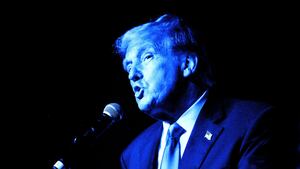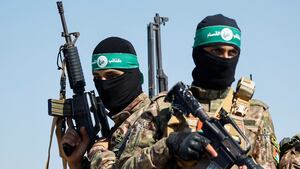Tensions are understandably high after the horrifying bloodshed resulting from the Hamas terrorist attack on Israelis this past weekend and the subsequent threat of a “complete siege” of Gaza. Far beyond the site of conflict, incendiary statements are leading to ongoing debates over what’s socially acceptable to say after, and during, a highly politicized tragedy.
But amidst our quest to set social parameters around what should be expressed, we often find coinciding legal efforts to define what can be expressed, to the detriment of our free speech rights.
Nowhere was this threat more evident than in the U.K. Home Secretary Suella Braverman’s letter this week to chief constables in England and Wales. In it, Braverman advised officers not just to focus on policing “explicit pro-Hamas symbols and chants” but to consider whether other expression—referencing Palestinians, not Hamas—could constitute a criminal offense.
Braverman singled out the chant “from the river to the sea, Palestine will be free” as “expression of a violent desire to see Israel erased from the world” as well as “the waving of a Palestinian flag,” which she said could be criminal in some contexts. And Interior Minister Gerald Darmanin reportedly notified prefects across France that pro-Palestinian rallies would be banned due to their likelihood “to generate disturbances to public order."
While these chants and symbols may be deeply offensive and painful to many, government officials should seek to use the law to protect rights, not feelings.
The Home Secretary’s advisory to U.K. police also coincided with letters from European Commissioner Thierry Breton to Elon Musk’s X and Mark Zuckerberg’s Meta warning of the E.U.’s Digital Services Act and platforms’ obligation to address disinformation and “potentially illegal content.”
The flood of murky information surrounding this past weekend’s developments is no doubt troubling, and at times has made it difficult to glean accurate, up-to-date news. But as Mike Masnick writes at Techdirt, “it should never be the job of the government to step in and threaten websites over their moderation practices,” which opens up immense opportunities for abuse and censorship of government critics and dissenters.
Even in the United States, some demands for state-sanctioned censorship are emerging. Rep. Derrick Van Orden (R-WI), for example, announced he’ll be seeking “the removal of all public funding from this anti-American moss covered dump called Harvard” in light of university student groups’ joint statement holding Israel “entirely responsible” for the recent violence.
Rep. Mike Lawler (R-NY) also called for any university “that allows these anti-Semitic rants” to “lose any and all federal funds.”
This desire for censorship is disappointing, but it’s certainly not new.
At the Foundation for Individual Rights and Expression (FIRE), where I work, we’re well familiar with the history of censorship surrounding the Israeli-Palestinian conflict—especially in higher education—and, as a nonpartisan free speech organization, we have frequently defended the rights of advocates and critics on all sides of it.
The long legacy of challenges to the expressive rights of Israel’s critics, supporters, and those everywhere in between, should be a lesson both to the people clamoring for speech suppression and the government officials seeking to enforce it.
These censorship demands have not eliminated the source of conflict, nor solved disagreements among those with deeply diverging views on the Israeli-Palestinian conflict. Instead, all they have accomplished is chipping away at the foundations of their shared rights and sharpening the saw that will cut off the branch on which we all sit.
Protection of speech that cuts to the core, while sometimes uncomfortable, helps free societies thrive. In Texas v. Johnson, the Supreme Court of the United States affirmed that burning the American flag is protected expressive conduct, despite the widespread social condemnation it evoked then in 1989 (as it still does today). The Court wrote that “the flag’s deservedly cherished place in our community will be strengthened, not weakened” by upholding the right to desecrate it.
Doing so is “a sign and source of our strength,” not weakness.
This same idea should guide Americans, as well as other free nations, weighing how to respond to the latest news out of Israel and Gaza. It is not strength to silence unpopular political views. It is weakness.
The right to wave an Israeli flag depends on the same protections afforded to those who wish to wave a Palestinian flag. One cannot exist without the other.
In the coming days, we’ll likely see more contentious disagreements over what should be said about the ongoing conflict, and how it should be said. But we must stay vigilant against government officials’ efforts to put a thumb on the scales to settle these disputes through force and coercion, rather than discussion and debate.
Regardless of where you stand on the conflict today, the political winds may eventually shift and change. But your right to speak about it shouldn’t.









